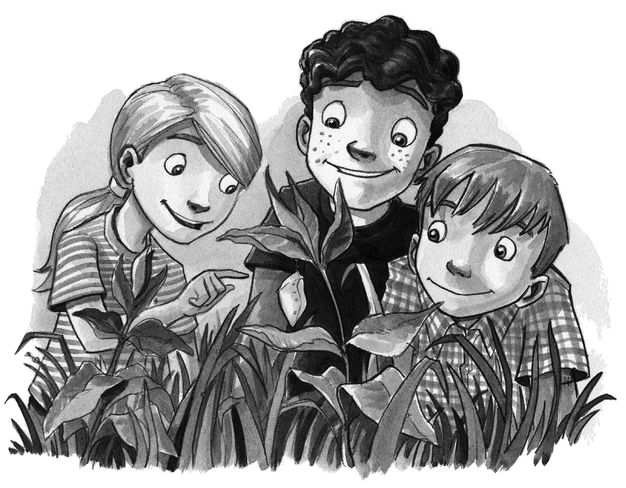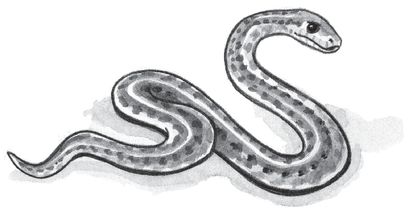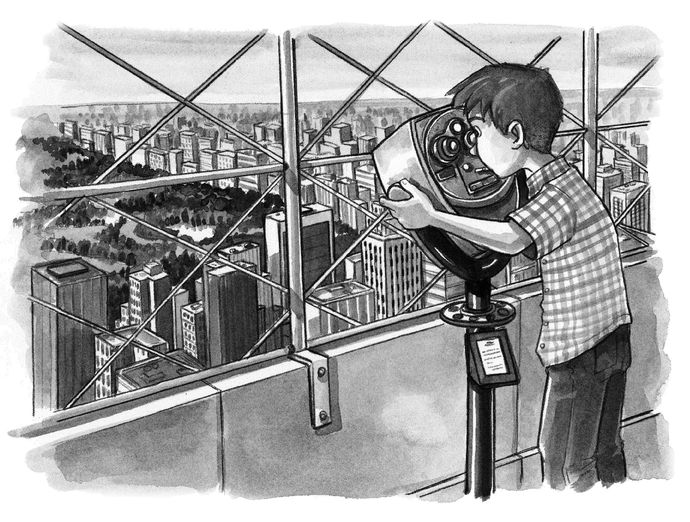Your Backyard Is Wild (3 page)
Read Your Backyard Is Wild Online
Authors: Jeff Corwin

Suddenly Lucy hopped down and walked toward a patch of weeds and waist-high grass. She crouched down in front of a tall plant with giant seed-pods and examined one of its leaves.
“Check this out!” she called to Benjamin and Gabe. “It’s a butterfly cocoon!” The tiny brown cocoon was clinging to the underside of the leaf. You could see it only when the breeze blew.

Gabe drew closer and looked at the cocoon. “It looks like a dead leaf to me.”
“That’s what cocoons always look like,” Benjamin told him.
In a flash, Benjamin was beside his sister, taking his magnifying glass from the back pocket of his jeans. He had known it would come in handy! He squinted through it at the leaf. “That’s a milkweed,” he said. “Monarch butterflies love it. The caterpillars fill up on the leaves before they go into their cocoons.” He picked a seedpod off the stem and touched the sticky white liquid that had gathered near the top of it. “Yup, definitely.”
“What’s it doing here?” asked Gabe.
Benjamin smiled. Gabe might know his way around Brooklyn, but he didn’t know his way around the outdoors. “Milkweed grows almost everywhere,” he said.
“But how do you know all this?”
Benjamin just knew. He’d known since he was a toddler. It was hard to explain, but somehow he managed to find the words.
“I know nature the way you know Brooklyn!” he said.
Chapter Three

B
enjamin awoke with a start the next morning. Something wasn’t right. When he opened his eyes, he knew he was at Gabe’s house—that wasn’t what was bothering him. Then he realized . . . it was noisy! He could hear garbage trucks rumbling in the street and people talking on their cell phones on the sidewalk five floors below. Uncle Peter had called this a quiet neighborhood, but it was louder than anywhere Benjamin had ever woken up before.
enjamin awoke with a start the next morning. Something wasn’t right. When he opened his eyes, he knew he was at Gabe’s house—that wasn’t what was bothering him. Then he realized . . . it was noisy! He could hear garbage trucks rumbling in the street and people talking on their cell phones on the sidewalk five floors below. Uncle Peter had called this a quiet neighborhood, but it was louder than anywhere Benjamin had ever woken up before.
The family had bagels for breakfast—a New York specialty—and then walked to the subway station to wait for a train that would take them right into the center of New York City. They would walk from the subway stop to the Empire State Building! From the top, they would see the whole city spread out before them.
The cousins stood on the platform with their parents, and Benjamin could hear his dad telling Aunt Lily about some of the work he did as an ecologist. “And Elizabeth teaches biology in the zoology department of the local college,” he heard his father say. “She studies animals and shares her research with her students. What I do is a little different, though. I study the way those animals interact with their environment.”
Benjamin had heard this explanation before, so he tuned out and looked at his watch. It was hot on the platform, and there was a damp smell, too.
He felt a slight breeze. Then he heard a distant rumbling. He wondered what it was and looked at Gabe, who said, “A train.”
Air-conditioned? Benjamin wondered, sweating. But the train flew through the station so fast that he couldn’t even count the cars.
“An express,” Gabe added. “It doesn’t stop at every station.”
Benjamin nodded and stared at the subway track. It was four or five feet below him, in a deep tunnel. And . . . there was something moving down there!
He nudged his sister. “Hey, Lucy,” he said, pointing. “I think it’s a rat!” They watched as the rat rummaged through a fast-food bag that someone had thrown on the tracks. It licked what was left inside of it, then came out with cheese on its whiskers. Soon two more rats joined it, and they scurried down the track, looking for more food.
“Oh, man,” said Gabe, following his cousins’ glance. “We learned about those guys in school. The rats in the subway are called Norway rats. Gross!”
Benjamin said, “I think they’re kind of cool, actually. See how the color of their fur matches the color of the wood and metal of the tracks? They’re camouflaged, so you don’t notice them at first. But when you do, you can see there are lots of them!”
“Who’d think any animals live down here at all?” Lucy added. “They must have adapted in other ways, too.”
Another train was coming—Benjamin knew the signs now. The rats disappeared into the darkness, and the subway train whooshed into the station. As the doors opened, Gabe said, “If you think they were cool, just wait till you get to the top of the world!”
Benjamin drew in his breath as he walked into the grand lobby of the Empire State Building. Its ceiling had to be two or three stories above him, and everywhere he looked there was marble.
That’s when they started waiting in line. First, the security line. Then the ticket line. And then the line for the elevator to the top. After a while, even the grown-ups got restless.
Once they got up to the top, though, Benjamin realized it was all worthwhile. It was a bright, sunny day, and it seemed he could see almost all the way back to Florida. He followed Gabe through the gift shop and outside onto the observation deck.
Gabe went into tour guide mode right away. “To the west, the mighty Hudson River and the lovely skyline of New Jersey,” he said, leading his cousins to one side of the building. He didn’t spend much time there but motioned for his cousins to follow.
He showed them his neighborhood to the east—they could see the Brooklyn Bridge again, this time in miniature—and the Statue of Liberty to the south. From here, the towering buildings looked like gift boxes and the cars looked like ants.
Looking north, they could see a patch of grass and trees set in the middle of the city. A pond near its edge glittered in the sunlight, and immediately Benjamin felt an urge to explore it. Gabe followed his glance and said, “Central Park, of course. Centrally located, as you can see.” Benjamin made a mental note to move it to the top of his must-see list.
Gabe reached into his pocket for some quarters and fed them into a set of binoculars on a stand. Lucy looked into them first, exclaiming, “I can see people walking on the street now—a hundred stories below. Wow!”

“This is the best way to spend your first day in the city,” Gabe announced importantly. “From up here, you can see how everything fits together. And then you can visit the sights one by one.” He sounded so grown-up that Benjamin wondered if his parents had said this to other visitors.
Lucy stepped down from the stand, ready to give Benjamin a turn. But Benjamin had taken out his own binoculars. He was looking at the sky!
She nudged him and teased, “Um . . . you’re looking the wrong way?”
“I just thought of it,” said Benjamin, “but this is an awesome place for bird-watching!” He handed his binoculars to Lucy. “Look there,” he said, pointing. “Do you see the pigeons?” She didn’t really need the binoculars—the pigeons were perched on a corner of the building a few stories beneath them.
Benjamin told Gabe what he knew about the birds. “You probably think they’re pests,” he said, “since there are so many of them in the city. But did you know they were brought to this country by European settlers, who ate them? They were considered a treat!”
“Wow,” Gabe said. “That’s interesting. But, you know, the big thing up here is the view.”
Obviously Gabe had never been on vacation with the Baxters. They liked to learn about the local animals wherever they went. “I just think it’s amazing to see the birds from up here, not from down below,” Benjamin said, taking the binoculars back. As he turned around, he saw a tour group walking toward them. They were looking and pointing, and he heard someone mention the words “peregrine falcon.”
“Did you hear those people talking?” Benjamin asked Gabe and Lucy. “Somebody over there just spotted a falcon!” he exclaimed.
Benjamin found his mom and told her about the falcon—then she went off in search of someone who could tell them more. It turned out that everyone who worked at the Empire State Building knew about the wildlife in the New York skies.

“Oh, yes,” a woman in a uniform confirmed. “Peregrine falcons use the building as a hunting ground. They perch on the observation deck and wait for smaller birds to fly by. Yellow-billed cuckoos, orioles, warblers, and many other birds are disoriented by the towers’ lights at night. The falcons can catch them off guard!”
“What about pigeons?” Benjamin asked. “Do falcons hunt them, too?” The ones he’d seen would be easy for a falcon to catch.
“Oh, yes,” the woman confirmed. “In cities, falcons help keep the pigeon population under control. Pigeons know the territory well, but falcons have superior speed. When they hunt, they fly very high, then dive down sharply toward their prey. When the falcon hits its target, it comes back and grabs it in midair. Pigeons better watch out!”
She also said that the building’s lights were dimmed during certain weeks of the spring and fall, because the Empire State Building was directly in the path of flocks of migrating birds. “If the lights are at full brightness, the birds crash into the building,” she said. “White-throated sparrows and common yellowthroats are some of the birds most at risk.”
Benjamin quickly sketched a falcon in his notebook. Then he scribbled all the information down and tried to remember the details for when he went back to school. These were things that not many people knew about the Empire State Building, not even a native New Yorker like Gabe.
Back on the street, Gabe insisted that they all buy hot dogs from a sidewalk vendor for lunch. “Another New York experience,” he said. Then the families took the subway back to Brooklyn. They didn’t see any rats this time, but Benjamin did hear some amazing music from the musicians in the station. Their catchy beat echoed off the tiles and made the station seem almost like a dance club!
The day was growing hotter, and the grown-ups didn’t feel like doing any more sightseeing. When Gabe then suggested the playground back at the Promenade, the adults were relieved. They sat at a picnic table in a shady spot, while the kids took turns on the monkey bars.
Waiting for his turn, Benjamin walked over to a sandbox. It looked like it hadn’t been used in a while. Sticks and leaves were scattered over the sand, and some big rocks were stuck in the middle of it. Benjamin picked up one to move it. Beneath the rock, a centipede squiggled in the sand, and Benjamin picked it up.
Other books
Is You Okay? by GloZell Green
No Heroes by Chris Offutt
Minty by M. Garnet
Stepbrother Troubled: The Complete Series by Sybil Ling
Black Spice (Book 3) by James R. Sanford
The Baron's Quest by Elizabeth Rose
Queens Full by Ellery Queen
When Sparrows Fall by Meg Moseley
Zombies by Joseph McCullough